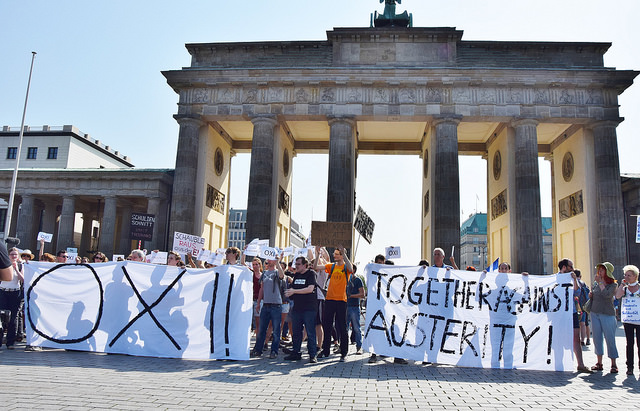After six days of workshops, discussions, practical activities and fun the summer school on degrowth and climate justice at the climate camp Rhineland has come to and end. With the slogan "Degrowth in Action", the summer school did not only break down the rather theoretical ideas of degrowth into concrete actions such as those against lignite mining in the region. It also provided an opportunity to directly experience what can be called "degrowth-life" on-site: The infrastructure for the more than 1000 participants of summer school and climate camp was completely self-made, starting from open-air cold showers and compost toilets via portable solar panels and a DIY low-tech windmill up to the vegan field-kitchen that depended on constant voluntary help by the campers. The decentral, non-hierarchical decision-structures on-site were another opportunity to experience how alternative organizational structures might look and feel.
But luckily, this was not all. More importantly, the summer school was a place to build up solidarity and alliances with activist movements all over the world. It became clear that, in all their diversity and with all their differences, emancipatory movements from North and South understand themselves as part of a broad global movement for systemic change. A vision that connects e.g. the countless local climate justice movements from the global South with the anti-coal movement in Germany; the struggle of the Kurds in Rojava with the anti-austerity movements in Southern Europe; the Degrowth with the Blockupy and the anti-TTIP movement and many many more. "Our struggle is with yours" as Heather Milton Lightening from the indigenous-led Canadian anti-tar sands campaign nailed it down.
On the closing panel it was emphasized however, that, important as all these alliances are, it is essential not to stop here. To put it with Tom Kucharz, political advisor for Podemos in Spain, the challenge now is to bring the struggle against the various symptoms of the failure of the economic system to a new political level mounting in joint action for real system change. As for COP 21 for example, the next UN climate summit in Paris, he sees the main challenge in not repeating the mistakes of Copenhagen to create hope around the official process. The movement has to stay firm instead and insist that it is not about climate change alone, but complete system change.
If it were up to the determination shown here at the climate camp, there would surely be nothing to fear about. One of the participants got a round of applause in the closing session when saying that being at summer school and climate camp has convinced him to take part in "Ende Gelände", the mass action against lignite mining as a first step of concrete action right thereafter. Finally Tadzio Müller, campaigner for climate justice, put Ende Gelände in line with many historic achievements that wouldn´t have been possible without concrete actions of civil disobedience.

Degrowth addresses the negative consequences of consumerism (psychological stress, long working hours and positional competition) and discusses the benefits of frugal lifestyles. Henri Lefebvre, a French philosopher from the 20th century, argues that if ideas or values are not physically implemented in space, they become mere fantasies. As such, if degrowth wishes to prevail, it has to leave it...
Local action is often the best remedy for the failings of the current system — a worldwide confederation of democratic communities can have the same impact at a global scale. Today we are seeing an inspiring resurgence of progressive action at the local level, even as reactionary nationalist movements in Europe and beyond seek to position themselves as the true voices of a renewed localism. ...

By Nina Treu According to recent calculations by the Macroeconomic Policy Institute the Euro-crisis has cost Greece almost a quarter of its GDP. This is the biggest ever recorded contraction of an economy in times of peace. It would be cynical to consider this an example for degrowth (or postgrowth) in Europe. This is certainly not the case. On the contrary, the mission statement of the degrow...